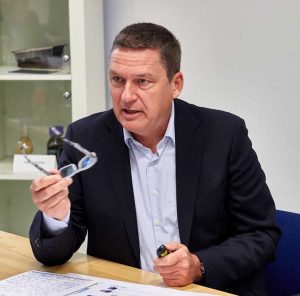
Freudenberg Sealing Technologies (FST) is regarded as one of the pioneers of fuel cell technology, at least in Germany. The globally active seal manufacturer is one of those automotive suppliers who see the far-reaching changes in the mobility sector as an opportunity. With the purchase of battery manufacturer XALT Energy and parts of FC supplier Elcore in 2018, the basis was laid. Claus Möhlenkamp, Chairman of the Management Board, explained to H2-international that this combination brings not only technological but also cost-specific advantages.
FST sees great potential above all in maritime transport and buses. The first projects with renowned partners such as Meyer Werft or Flixbus have already started. While intensive consideration is being given to entering the charging infrastructure, Elcore’s activities in the FC heater sector have now been shelved.
H2-international: A number of companies have now given up due to the frequent shifts and delays in the fuel cell sector. Why have you remained true to this technology?
Möhlenkamp: Twenty years ago we started with the basic development and production of components. As the market was not yet mature at that time, we initially scaled back our activities considerably. But the know-how was not lost. The knowledge remained in the company. Reactivating this was relatively easy for us.
How do you monitor current market developments?
Electro-mobility and its many facets – not just the battery-electric variant – are bringing back interest in the fuel cell. In addition to passenger cars, commercial vehicle manufacturers or shipbuilders in particular are showing great interest in this technology. The market thus becomes much wider. This is why we are expanding our know-how and are now building complete fuel cell stacks.
At the end of 2017, the takeover of parts of the FC heater manufacturer Elcore (see H2-international issues Jan. and Apr. 2018) caused a sensation. Was this the necessary step towards expanding expertise?
Yes, you could say that. Elcore has built complete systems including reformer equipment. That was very attractive for us. We have acquired over 60 patents with Elcore. For us, this is the technology basis in the sector of fuel cells.
Elcore’s expertise was in high-temperature PEM (HT), in mobile applications they rely particularly on low-temperature PEM. How did you manage this technological change?
That was relatively simple, because there are many identical parts and a great similarity, for example in the processes. The biggest difference is that the plastic membranes in the HT-PEM have to withstand higher temperatures.
read more in H2-international February 2020

























0 Comments